- Bitcoin hits new all-time high
- Gold climbs as dollar falls below 90
- Oil higher as stockpiles fall
Key Events
On Thursday, futures on the Dow, S&P, NASDAQ and Russell 2000 were once again trading in the green as markets were buoyed by the apparent, continued progress on a much-anticipated US fiscal aid bill. European stock markets were also ahead, extending a rally as EU lawmakers’ approved a 1.8 trillion-euro ($2.2 trillion) stimulus package.
Global Financial Affairs
S&P 500 contracts advanced—edging to a record—after the Fed, on Wednesday, reiterated}} its commitment to supporting the US economy for as long as needed. Meanwhile Congressional leaders are reported to be ironing out the finishing touches to an almost $900 billion COVID aid package.
The fiscal supports would renew subsidies for businesses suffering from the pandemic, distribute vaccines, fund schools, and restart jobless benefits that are about to expire. Negotiators also hope to include new direct payments of about $600 to most Americans.
European shares listed on the Stoxx 600 opened higher and extended advances amid a cyclical rotation with miners and travel firms benefiting.
The pound jumped to its highest since May 1 after officials with knowledge of the Brexit negotiations intimated that a divorce agreement—which has long eluded EU and the UK negotiators—may be reached within days. We have been bullish on the pound sterling for a while now.
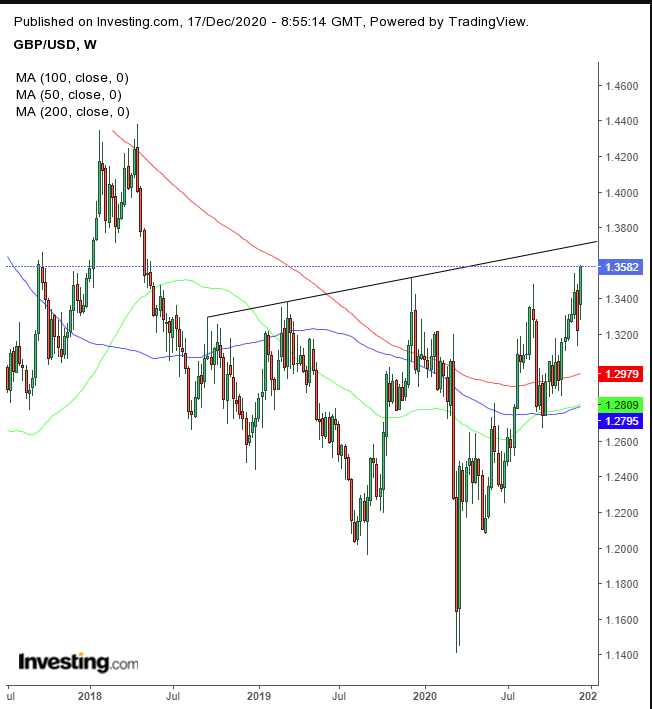
Cable is on the verge of a massive bottom, whose upside breakout will all but seal a continued rally for some time.
The FTSE 100, the UK's major equity index, on the other hand, is struggling despite housing shares pulling the index higher on Wednesday on the news that U.K. house prices reached record highs. Yesterday's hike also suggests that investors believe a Brexit deal will materialize.
On a day when most global benchmarks are enjoying noteworthy rallies, perhaps the strengthening pound, which will hurt UK exports, is weighing on the index.
Earlier, most Asian indices gained, boosted by hopes that a US stimulus-driven, economic recovery is in the cards. Australia’s ASX 200 outperformed the region, jumping 1.16%, nearing a 10-month high and almost recovering from its coronavirus crash. The index was boosted by faster recovery projections due to the imminent roll-out of the COIVD-19 vaccine.
China’s Shanghai Composite followed close behind, up 1.3%. Healthcare and financial firms led the rally as investors there are also hopeful of a quicker recovery.
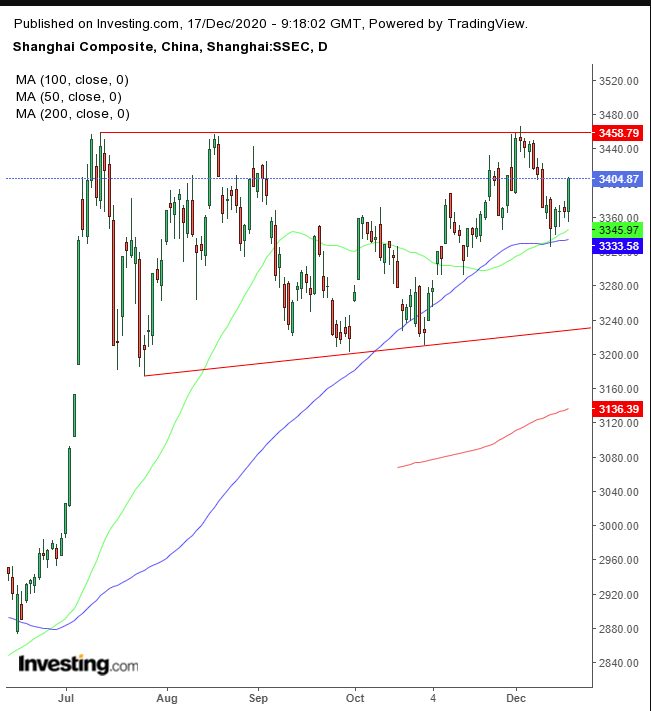
The benchmark of the world’s second largest economy is set for a bullish breakout. The price is nearing the top of an ascending triangle.
American stocks advanced on Wednesday even though the Fed disappointed some traders by not increasing its Quantitative Easing program. However, Senate Majority Leader Mitch McConnell said that the recent round of Congressional talks would lead to a coronavirus aid deal. Thin trading volumes paved the way for retailers and technology companies to lead the advance.
The tech heavy-NASDAQ 100 outperformed for the second consecutive day and for the third time since Friday, possibly showing that the cyclical rotation may be fading.
The Fed's dovish decision provoked a Treasury selloff, pushing yields, including on the 10-year note, higher.
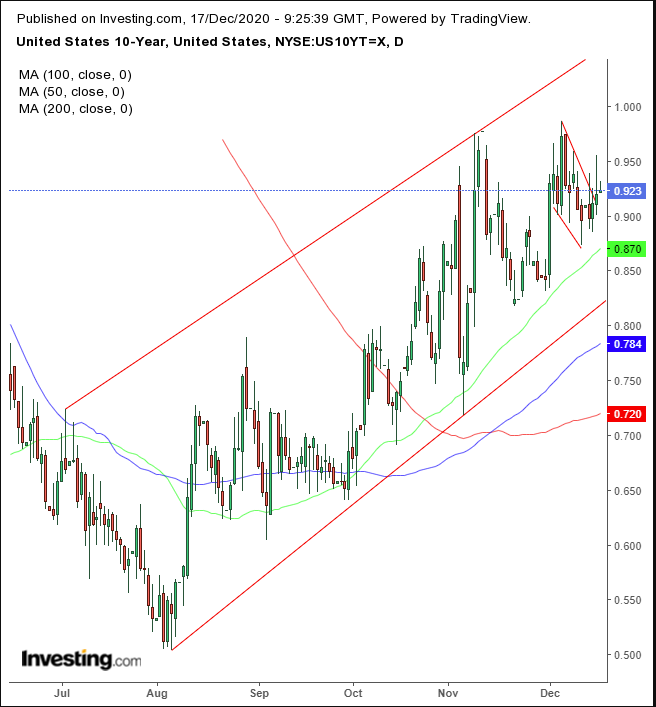
Higher rates were expected after the pattern developed a bullish flag.
Rising odds of a stimulus package continue to devalue the dollar.
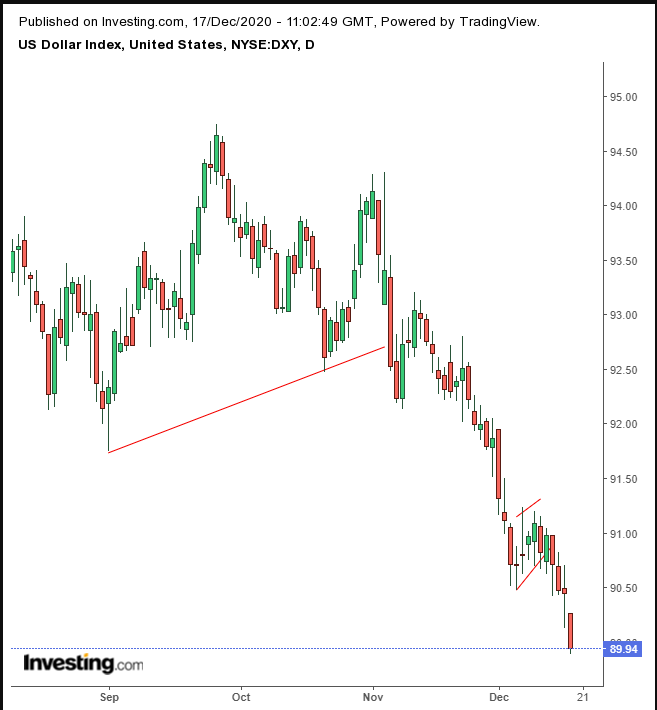
The USD extended the penetration of a bearish flag, dropping below 90 for the first time since April 2018, falling along the path to a potential all-time low.
Gold continued to surprise, as it apparently finally recalibrated to its rightful, negative correlation to the greenback.
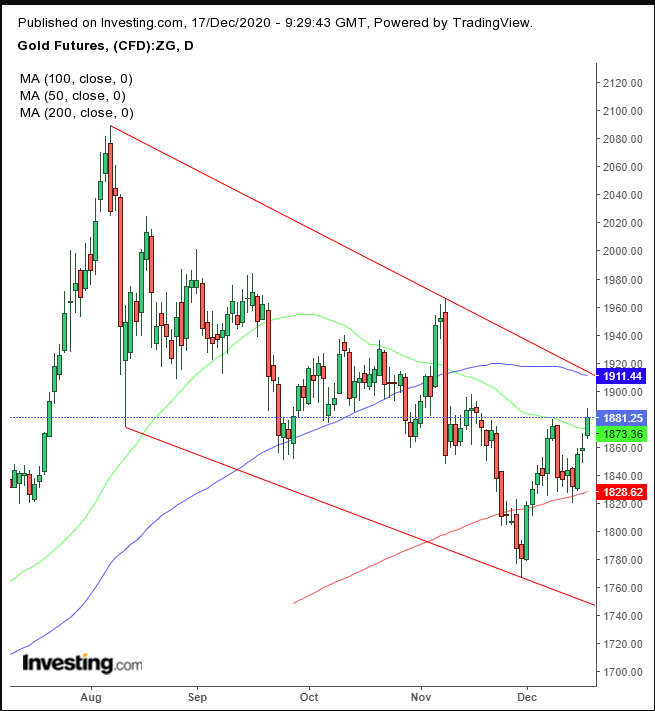
The price cut through the 50 DMA, taking aim at the 100 DMA, which has realigned with the top of a falling channel.
Bitcoin climbed for the sixth straight day, rapidly pushing past $20,000. It's on pace to show gains for the third month in a row.
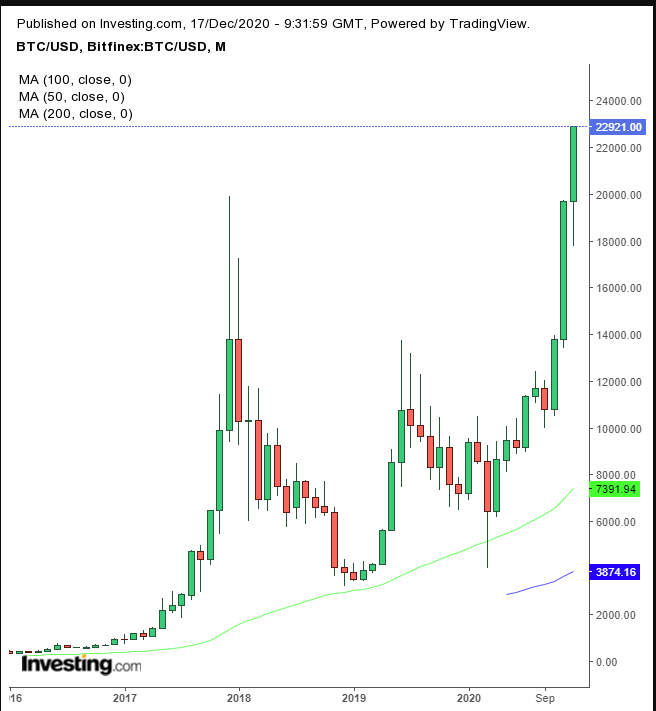
The cryptocurrency is shooting into space, well past its previous all-time high of $19,870 hit during December 2017 and is now flirting with the $23,000 level, as institutions have come to embrace this new investment asset class t. Will $20,000 now be the new floor?
Oil built on its advance after an unexpected decline in stockpiles.
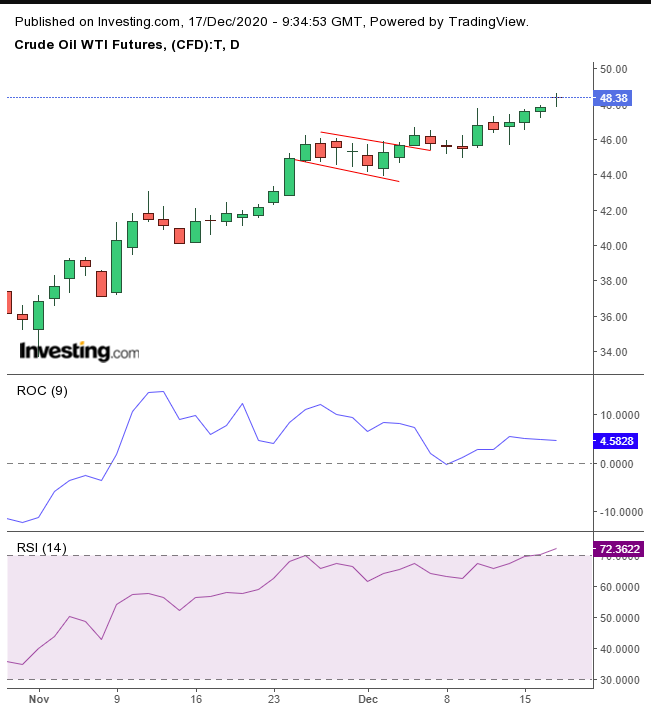
However, traders might consider this an appropriate time to start taking profits after a 6% jump from the bullish flag, with the RSI overbought and the ROC providing a negative divergence.
Up Ahead
- US initial jobless claims and {{ecl-25||building permits are printed today.
- On Friday the Bank of Japan and Bank of Russia announce policy decisions.
Market Moves
Stocks
- Futures on the S&P 500 Index gained 0.5%.
- The Stoxx Europe 600 Index climbed 0.4%.
- The MSCI Asia Pacific Index advanced 0.7%.
- The MSCI Emerging Markets Index increased 0.5%.
Currencies
- The Dollar Index fell 0.6% to 89.94.
- The euro gained 0.3% to $1.2235.
- The British pound jumped 0.5% to $1.3576.
- The onshore yuan was little changed at 6.536 per dollar.
- The Japanese yen strengthened 0.3% to 103.20 per dollar.
Bonds
- The yield on 10-year Treasuries jumped one basis point to 0.93%.
- The yield on two-year Treasuries was unchanged at 0.12%.
- Germany’s 10-year yield gained less than one basis point to -0.56%.
- Britain’s 10-year yield advanced one basis point to 0.28%.
- Japan’s 10-year yield increased less than one basis point to 0.011%.
Commodities
- West Texas Intermediate crude gained 1.2% to $48.38 a barrel.
- Brent crude advanced 1.2% to $51.67 a barrel.
- Gold strengthened 0.7% to $1,877.19 an ounce.
